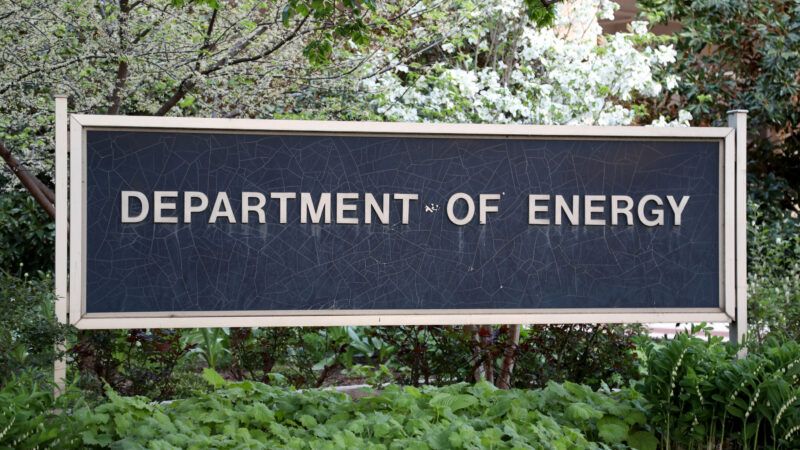The Department of Energy Misspent Nearly $1 Billion in 2024
While $1 billion is a drop in the wasteful spending bucket, fiscal irresponsibility of all sizes must be eradicated.

The Department of Energy is a breeding ground for fraud and abuse—like most government agencies. In its recently released Fiscal Year (FY) 2024 performance report, the agency's Office of Inspector General identified nearly $1 billion of wasteful spending this year.
In 2024, audits from the Inspector General found more than $814 million of questioned and unsupported costs and nearly $123 million in funding that could be better used at the Department of Energy. About $25 million went to restitution, court cases, and penalties, or was returned to the agency.
One of the most egregious instances of waste occurred at Argonne National Laboratory. An audit conducted this year of FY 2019 spending at the institution found that UChicago Argonne, LLC (the third party that manages the laboratory) used improper accounting practices and insufficiently audited subcontractor costs. As a result, the Inspector General has identified $232,495,716 in questionable spending that needs to be further reviewed.
The National Nuclear Security Administration was also audited this year for its contract with NORESCO (an energy service provider) to improve energy and water efficiency at one of its plants in Texas, which it entered into in 2005. Under the terms of the agreement, NORESCO guaranteed the agency would see lower energy costs. Contractual changes reduced the scope of the project, which the federal government missed. As a result, it paid over $6 million from 2018 to 2021 for energy savings that were never realized. The contract with NORESCO has since been terminated, which the Inspector General says will save taxpayers $2.5 million.
Meanwhile, the Department of Energy awarded a $100 million grant to a company that was under investigation for potentially violating U.S. law and exporting semiconductor manufacturing equipment to China, which the awardee did not disclose to the department. The Inspector General notified the agency, which subsequently de-obligated the grant. The investigation is ongoing.
Improper vetting of grant applicants is not uncommon at the department. Indeed, the performance report warns more than $4 billion of funding for federal energy rebates is at risk of fraud due to insufficient oversight and certification in the programs' application process.
This risk is expected to increase in the coming years, according to the Inspector General. A slew of recent legislation, including the Inflation Reduction Act and annual appropriations have supercharged the budget of the Loans Program Office—which supports projects that would likely not be funded by financial institutions—from $17.2 billion in 2021 to more than $400 billion today. With $290 billion and $52 billion set to expire by FY 2026 and FY 2030, respectively, the pressure to get money out of the door before these deadlines leaves this funding especially vulnerable to fraud and abuse.
Rescinding unspent money by repealing the Inflation Reduction Act would help negate future risk. However, doing so would require support from the U.S. House of Representatives and is unlikely to happen since the bill has mostly benefited Republican states and congressional districts.
While $1 billion is merely a drop in the wasteful spending bucket, it is unacceptable nonetheless. As the incoming Trump administration and Congress set their agenda, they should abolish everything and target all reckless government spending, no matter the size.
Editor's Note: As of February 29, 2024, commenting privileges on reason.com posts are limited to Reason Plus subscribers. Past commenters are grandfathered in for a temporary period. Subscribe here to preserve your ability to comment. Your Reason Plus subscription also gives you an ad-free version of reason.com, along with full access to the digital edition and archives of Reason magazine. We request that comments be civil and on-topic. We do not moderate or assume any responsibility for comments, which are owned by the readers who post them. Comments do not represent the views of reason.com or Reason Foundation. We reserve the right to delete any comment and ban commenters for any reason at any time. Comments may only be edited within 5 minutes of posting. Report abuses.
Please to post comments


"While $1 billion is a drop in the wasteful spending bucket, fiscal irresponsibility of all sizes must be eradicated."
...and a good way to do that is to eliminate all the alphabet federal bureaucracies.
Just think of the billions, if not trillions, of dollars that would be saved.
Wow, I thought they would have wasted a lot more than that.
Nothing left to cut.
"U.S. House of Representatives and is unlikely to happen since the bill has mostly benefited Republican states and congressional districts. "
You link to a Reason article, that links to a Bloomberg opinion piece.
That's some journalism there. Just write unnamed sources.
Remember that day the people passed the Constitutional Amendment for a US Department of Energy?
Maybe the whole F'En Multi-TRILLION spent on Gov-Gun dictated Energy sector is a 'waste of money'.
What Department of Energy? - DOGE committee
You and the audit make a great case for banning all DOE contractors and making all contractor employees who do the actual work full-time federal employees accountable to the agency. Neither you nor the audit show the projects themselves are not worthwhile if properly carried out.
"properly carried out" ... according to WHO?
Having every laborer/earner decide if the cost is "worthwhile" is about as good as that judgement can possibly ever get. 3rd party useless waste-of-space criminals 'Gunning' for "other peoples $" spenders will never be.
And how often are "full-time federal employees accountable to the agency" terminated for performance reasons? How many have ever been subjected to rack-and-stack operations where the bottom 10 or 20% in performance are terminated?
Just listened to Joe Rogan #2237 Mike Benz
I have a better idea of where that money goes now.